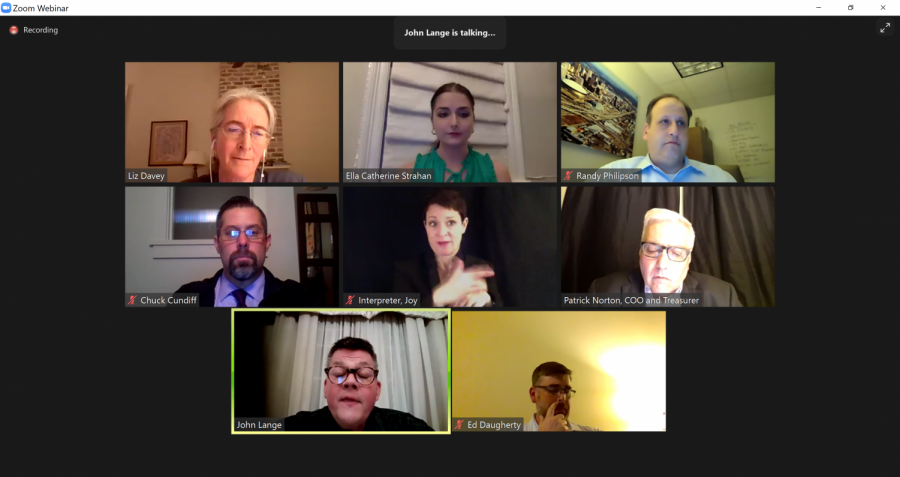Tulane leadership discusses current sustainability efforts on campus
February 15, 2021
On Wednesday, Feb. 10, President Mike Fitts and a panel of Tulane leadership engaged in a Sustainability and Climate Action Town Hall, moderated by Ella Catherine Strahan, Undergraduate Student Government director of sustainability. The goal of the town hall was to discuss current sustainability initiatives on Tulane’s three campuses and discuss present concerns and questions about current sustainability operations.
Patrick Norton, senior vice president and chief operating officer for Tulane, kicked off the event with a presentation on the strides Tulane is making towards its sustainability goals. From 2018 to 2019, Tulane reduced greenhouse gas emissions by 14.22%, aiming to have hit a 15% reduction from the 2007 annual emissions by the end of 2020 and a 30% reduction by 2025. Numbers from 2020 are expected to be released in the near future. He also highlighted current projects that are underway, including a solar energy project, Bruff Quadrangle residence hall’s low energy use plans and a fleet of electric shuttles coming to campus. By January 2022, “We’ll have five electric shuttles, and that’ll be half our shuttle fleet, that will be electric,” Norton said. “That’s pretty exciting.”
Liz Davey, director of the office of sustainability, continued the presentation to discuss new construction projects on Tulane’s campus. New campus construction, including the new Bruff Quad residence hall and renovations of Paul Hall science facilities, will be Leadership in Energy and Environmental Design certified, fulfilling environmentally friendly sourcing of materials and promoting efficiency and quality of energy in the buildings.
Stormwater management, the redesigning of infrastructure to collect water and help prevent mass runoff, is being implemented around campus as well, such as on the newly built Commons.
As the panel moved onto the Q&A portion of the event, student concerns were revealed and discussed by the group. Many of the questions focused on what awareness students, staff and the state of Louisiana had about sustainability efforts. The panel returned to discussing Tulane’s changes and plans, as well as the Louisiana Climate Initiatives task force that a few Tulane staff are working on.
Beyond Tulane, Davey emphasized the growing movement, saying, “It’s a really exciting moment to see the state realizing that the expertise of the energy industry can really be applied to clean energy sources and renewable energy. You see people thinking about how investments in clean energy can grow the economy, as well as reduce greenhouse gas emissions quickly.”
The panel was also asked about food waste on campus, addressing that especially during the COVID-19 pandemic, waste seemed to be increasing exponentially. John Lange, assistant vice president of dining services, event services and gameday management, said that Tulane is working on reducing food waste, sourcing their foods responsibly and donating foods that are not used from dining services and shelter-in-place responses. Ed Daugherty, general manager of residential dining, agreed with Lange’s statement, adding that composting and measuring food overproduction are ways that Tulane is working to manage and prevent further waste. Daugherty and Lange purposely “focus on local purchases. We both purchase from NATCO, which is a local beef company, and then we also partner with Gulf Coast Produce, who try to source as much food as they can from Mississippi, Texas, and Louisiana.” He also emphasized the growth of plant-based options on campus and the local sourcing of those ingredients.
The Town Hall was followed up by student-led breakout rooms to discuss the panel’s presentation and get feedback on the initiatives introduced. Strahan and Amanda Krantz, a senator on USG’s Sustainability Committee, discussed their frustrations with Tulane administration on sustainable initiatives. Strahan, currently working on an initiative for composting, described the conflict between student and administrative schedules.
“The amount of hours it really requires for a project to get off the ground isn’t something that we just need a team of ten interested students to just get together,” Strahan said. “The admin are bringing these ideas to the table and asking for our help, instead of the other way around.”
Krantz, Strahan, Fitts and the committee agree, though, that these are issues that should be pertinent on campus. “Every hour there is 100 yards of coastal erosion, and every day there’s 24 football fields of erosion on the coast of Tulane water,” Fitts said. “This is an issue that everybody has to confront. Everybody has to be thinking about how we are going to deal with it. It’s new: as a group, as individuals, us as an institution, as a subset of actors and as an academic institution.”























Leave a Comment